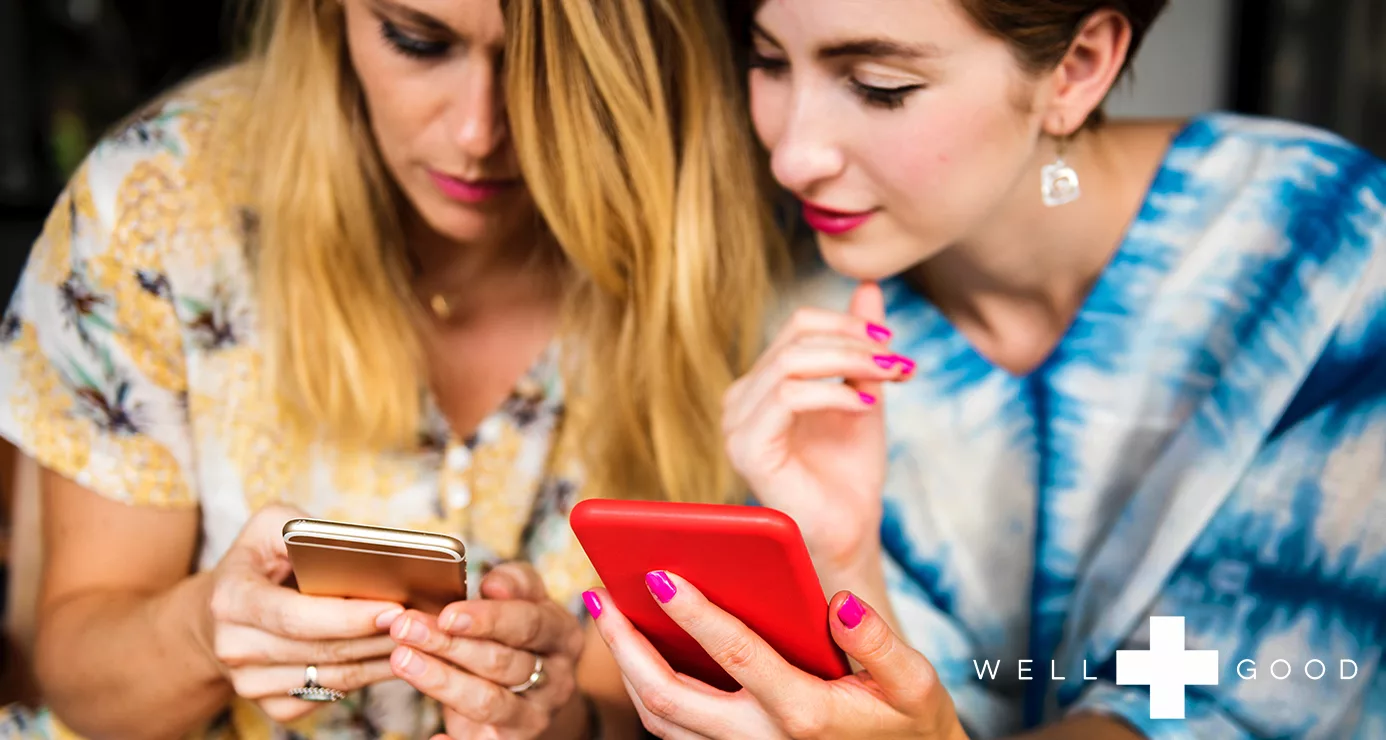So you love a good Snap, you Insta your meals on the regular, and you check your work inbox about, oh, every two minutes. Maybe you’ve even been known to tweet out symptoms, asking for a diagnosis from the Twitterverse (P.S. bad idea). Okay, so your relationship with your smartphone might be the teensiest bit obsessive. But it’s not like this can’t-stop-won’t-stop love affair is affecting your health, is it? The short answer: yes.
At the recent Future of Therapy conference, hosted by online therapy platform Talkspace, experts gathered to discuss the impact of technology and social media on our brains and body image. As it turns out, technology addiction isn’t just an innocent turn of phrase—every time you get a “like” or reach a social media milestone (5K followers!), your brain releases dopamine, a neurotransmitter that helps control its pleasure and reward center. (Another thing that triggers a dopamine surge? Cocaine.)
This becomes an issue when your gadgets keep you from fulfilling your responsibilities at home or at work. Cravings are also a sign of danger ahead. “Look at the physical symptoms of heroin withdrawal and you’ll see cell phone withdrawal is very similar. You’ve got shakes. You’ve got super high anxiety and increased heart rate,” says Jamison Monroe, founder and CEO of Newport Academy, a treatment center for teens.
But is cold turkey even really an option for most of us? “It’s not realistic in today’s world to tell people you have to get off your phone entirely. Most of our jobs depend on being [reachable on our phones], so it’s finding a way to normalize behavior,” says Julia Hormes, Ph.D., clinical and health psychologist and director of the Health Behaviors Laboratory at the University of Albany.
There are ways to tame the tech beast, though—keep reading for four tips from the experts about having a healthier and happier relationship with your gadgets.
1. It’s okay to be bored.
While you might hate waiting for a late friend or being stuck home alone, there is value to being bored. “It leads to a lot of creative and innovative thinking,” says Dr. Hormes.
But chances are you pull out your phone and entertain yourself with the latest Snaps or a scroll through your Instagram feed at the first sign of a dull moment. (Raises hand.) “Basically all these applications, all these behaviors really serve to distract from negative emotions. We don’t like to sit with boredom or sadness or anger and so getting on Facebook, getting on Twitter is a quick way to get away from that,” she says.
So how do we cope? “Learn how to tolerate boredom and other negative emotions and actually stay in anxiety, as opposed to having this constant need to escape through a screen,” says Katherine Glick, licensed professional counselor. Learn adaptive skills to get you through uncomfortable moments, such as asking yourself what’s going on internally to dredge up these feelings.
2. Don’t fall through the looking glass.
Just a reminder: Social media is not reality. “You’re only getting half of the picture of someone’s life. You’re hearing what’s going on that’s very positive, but not the challenges they’re undergoing,” says George Nitzburg, Ph.D., an adjunct professor at Columbia University.
Take fitspiration, for example—when you see impossibly-cut abs plastered all over your social media feeds, they start to become the new normal. (And they could also lead to dangerous behaviors, like obsessively tracking your weight.) “What we don’t realize is these are moments,” says Jenna Birch, a freelance health and lifestyle journalist. “It’s a highly staged photo most of the time.”
3. Make social media social again.
Although there is a downside to social, it’s also got its benefits. “Ultimately, these are tools for human connection and, at the end of the day, that’s what we want and that’s what’s healthy,” says Dr. Nitzburg.
Instead of mindlessly swiping right or going on a liking spree, take a moment to start or deepen a conversation, possibly even off your timeline. “Take a little bit more quality time to respond to people thoughtfully—really, it’s a simple solution,” says therapist Nicole Amesbury.
4. Use technology, but don’t let it use you.
“The most important thing is getting people to understand that we’re using the technology—the technology isn’t using us,” says Amesbury. Before you check your email at 8 p.m., ask yourself whether you’re doing it out of habit—and whether the world will come crashing down if you wait until the morning to look at new messages. (The answer is most likely no). Mindfulness is key, says Amesbury: “Each person needs to think about their use and why [they use it].”
Of course, technology can also be really good for us—it’s making our activewear smarter, our habits healthier, and our workouts, well, mind-controlled.






